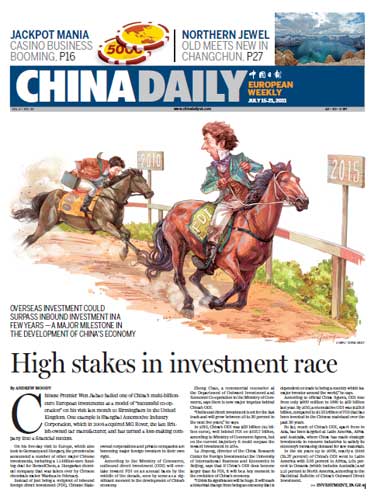Living happily ever after
Updated: 2011-07-15 10:59
By Liu Zhihua (China Daily European Weekly)
In their letters, the two seldom mentioned hardship.
Yuan shared with Li his happiness over becoming a father, and Li sent him tins of baby milk powder and clothes, knowing these products were scarce in China at that time.
When the "cultural revolution" (1966-1976) started, Li's letters were returned. To avoid causing any trouble to Yuan, she stopped writing but could not forget him.
"I could not start a new relationship, although there were many who knocked on my door," she says. "I found his love for me most earnest, and felt no one else could match that."
In 1976, as soon as she thought it was safe, Li wrote to Yuan's workplace as before. But that letter, too, was returned.
The next contact between them occurred in May 2010.
During the 2010 Spring Festival (in late February), Ouyang Luying, Yuan's third daughter-in-law, heard that her father-in-law had once dated a beautiful foreign teacher. Yuan's wife had passed away in 1994 and Ouyang encouraged him to write.
Yuan posted Li letters every second day and also wrote to her relatives lest she had passed away.
At last, a letter arrived from France. With trembling hands, Yuan opened it. Seeing the familiar handwriting, he thought, "Thank God! She's alive!"
The envelope contained a photo of Li and a three-page letter. In it Li took Yuan through all that had happened in her life.
In 1974, nine years after their last correspondence, Li earned the equivalent of a master's in Chinese and soon got a job as a Chinese teacher at a university in Lyon where she also earned a doctorate.
She retired in 1992 as an associate professor from the university, and then worked as vice-president in a non-profit organization, which helped the university's Chinese students.
She remained single and lived alone in a house her grandparent left her after her parents died.
On May 1, she saw Yuan's letter waiting for her when she returned home. "I didn't reply immediately, because I couldn't believe it was true," Li says.
She sat holding his letter in her backyard from noon till midnight. When another letter arrived the next day, Li was finally convinced this was no dream.
The couple started exchanging letters. Sometimes, with help from Ouyang, they would talk over the phone but preferred letters as Yuan suffers a mild hearing loss.
"Ouyang called me 'Danny Mom' during her first phone call. I had never been called mom before. I can't describe how I felt!" Li says.
A month later, Yuan invited Li to Xiamen, where Yuan and the family met her at the airport. Yuan held 55 roses to mark the years they've been apart.
Li accepted Yuan's offer of marriage, and they registered their wedding on Sept 21, the day before the Mid-Autumn Festival, traditionally a time for family reunions in China.
Yuan's sons held a big wedding ceremony for them five days later.
They now live with Yuan's third son and every morning they take a stroll along the city's waterways, hand in hand.
"What is gone is gone; we want to be with each other for the rest of our lives," Li says.
"I have poor sight, and he has a problem with hearing.
"I'm his ears, and he is my eyes."
E-paper

The perfect cut
Companies need to revamp, standardize to stave off quality challenges
Demystifying Tibet
Bubble worries
China calling
Specials

My China story
Foreign readers are invited to share your China stories.

90th anniversary of the CPC
The Party has been leading the country and people to prosperity.

Setting the pace in Turkey
China is building a 158-km high-speed railway in Turkey.
